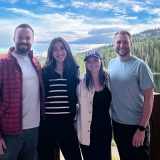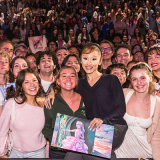It’s all about audio waves, writing, and workshops with our Summer Film Division course offerings
May 12, 2014
[UPDATED] Dodge College is offering a plethora of courses this summer. From writing, to visual design, to ProTools Certification there are plenty of opportunities to beat the June gloom and keep cool during the dog days of summer.
SUMMER SESSION 1 – June 2 to July 12
FTV 529-06 Cycle Project Screenplay Development
Instructor: Jeff Phillips
Tuesdays/Thursdays 2:00pm-5:45pm
Under the supervision of the instructor, students will work to strengthen and clarify their story for cycle films so that the writer’s intentions can be faithfully represented by the interpretive work of the director, and conform to the department requirements regarding the scope of projects. The script will be considered by faculty to be “scene locked” at the conclusion of the course.
FTV 329-07/529-07 Workshop in Preproduction Planning
Instructor: Bill Dill
Tuesdays/Thursdays 11:00am-3:00pm (Thursday session at various locations throughout OC/LA)
This course will consist of a series of visits to notable arts institutions within driving distance from campus. Locations include: Los Angeles County Museum Of Art, Hammer Museum on the Campus at UCLA, Getty Museum, Norton Simon, California Museum of Photography in Riverside, Museum of Photographic Arts in San Diego, Museum Of Contemporary Art, Pasadena Museum of California Art, Orange County Museum of Art, Bowers Museum, Orange County Center for Contemporary Art, Laguna Art Museum. The course will attempt to enlist the services of docents at these institutions to give guided tours of the highlights of these collections and to enhance the student’s understanding of the significance of the work shown. It will also focus on fine art and include tour collections of decorative art so that students gain a rudimentary understanding of the stylistic elements of production design created in their films.
FTV 329-09/529- 09 Visual Design Workshop
Instructor: Dave Kost
Mondays/Wednesdays 2:00pm-5:30pm
An in-depth and hands-on exploration of how visual elements like space, line, shape, tone, color, movement, and rhythm can be used to express story, emotion, and personal vision in movies. The class is a workshop in which theoretical concepts are studied and then applied to the analysis, design, and shot planning of individual student projects. The class is open to all, but ideal for directors and cinematographers in the process of planning a thesis or other production.For more information and registration, contact Professor Dave Kost: kost@chapman.edu
FTV 349-01/549-01 Advanced Writing Workshop –Writing for Genre
Instructor: Jeff Phillips
Tuesdays/Thursdays 9:00am-1:30pm
This class prepares students for writing what the major motion picture studios are making. It will cover the 9 most saleable genres in the business. In an era where indie dramas are almost entirely produced independently, students need to understand how to write for marketable genres if they want to work within the major studio system. The class will cover the tropes familiar to the major genres, give structural paradigms that lay out the stories from beginning to end, and create rich characters to drive stories. Genres include: Thrillers, Romantic Comedy, Serial Killer & Hitmen, Heist,Horror, Sci-fi/fantasy Action/War, Western
FTV 359-01/559-01 ProTools Certification
Instructor: Dan Pavelin
Mondays/Wednesdays/Fridays 10:00am-12:45pm
This course will explore Pro Tools, the industry standard software for film/television sound, in a completely hands-on environment, covering advanced functions such as additional editing tools, elastic audio, MIDI and virtual instruments, and more! And at the conclusion of the course, students will be eligible to take Avid’s Pro Tools certification exam and attain official “Pro Tools Certified User” status. This is the same material that Avid offers to professionals at training centers in Los Angeles, but Dodge College is offering it as a 3-unit course that you can take for academic credit, right here at Chapman! Bolster your resume, your Pro Tools knowledge, and your sound-editing skills all at once! **Grads, register for the course as “559.” Undergrads, register as “359.” This course can count on your major as an upper-division FTV elective. **Blocked by WebAdvisor because of class status or major? Please contact Dan Pavelin, 714/744-7866, dpavelin@chapman.eduto arrange to be signed in. **Prerequisites: FTV 133 Audio Techniques (undergrads), FTV 533 Fundamentals of Audio Design (grads), or instructor consent.
FTV 328-01 Seminar in Television Writing
Instructor: James Macak
Tuesdays/Thursdays 4:00pm-7:45pm
Jim Macak, Associate Professor at Emerson College in Boston, will return to Dodge College this summer to teach the Seminar in Television Writing for the second summer in a row. Jim is a Disney Fellow who spent over 15 years writing a variety of TV genres — from soaps (General Hospital)) to prime-time dramas (NYPD Blue) to comedy pilots (Beacon for Disney/CBS) to reality shows (Totally Hidden Video) to syndicated series (Pensacola: Wings of Gold) to TV Movies (Two Voices for Lifetime). Last summer, three of Jim’s Chapman students in this summer course went on to score as semi-finalists in the Acclaim TV Writing Competition. Jim First taught TV Writing at Chapman from 2004 to 2006 and several of his former Chapman students — now active in the TV industry — will return as well to speak to students in this course.
SUMMER SESSION 2- June 2 to August 2
FTV 329-04/529-04 The Continuous Take
Instructor: Roy Finch
Tuesdays/Thursdays 7:00pm-9:30pm
Continuous Shot, Long Take. One-shot. Oner. Different terms for the same principle: an uninterrupted (orseemingly uninterrupted) shot in a movie. From Orsen Wells to Alfred Hitchcock, Robert Altman, Brian de Palma, and Martin Scorsese, to the new directors, Park Wook, Steve McQueen and Alfonso Curon, some of cinema’s greatest director have challenged themselves with doing long continuous takes. Often times to open their movies. Many of these takes can be viewed as short films in their own right. And when done properly, the results are often some of the highlights and most memorable parts of the films they appear in. In this class students will view, analyze and deconstruct some of the greatest “continuous” shots in cinema history as well as shoot their own continuous take film project. Throughout the course students will come up with an outline, shooting script, blocking charts, camera movement plans, lighting plan, as well as look at ways to “hide” an edit. Attention will also be paid to the use of post production sound (including Foley and basic sound design) to create visual unity and enhance cinematic “world building.” The sky’s the limit! At the end of the course all student films will be screened.


